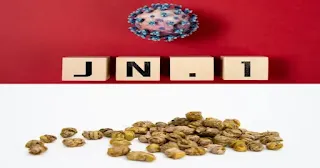“An interesting mutant” and the most widespread, this is how the World Health Organization described the new mutant of the Corona virus “ Covid-19 ”, which it called “JN1”.
The organization announced a high rate of infection with the new mutant around the world, as it rose by 52% between the period from November 20 to December 17 of this year. The organization advised taking vaccines to avoid infection and alleviate symptoms, and called for a return to commitment. With preventive measures such as wearing masks and continuous sterilization.
With the announcement of the “JN1” mutant, controversy returned again to communication platforms regarding the Corona virus and its symptoms, and whether it is a danger to humans or not, and many questions were monitored by Al Jazeera Net in the public’s comments.
Tweeters began publishing their experiences with the new mutant and the symptoms that accompanied their infection period. They said that they felt a loss of sense of smell, headache, nasal congestion, fever, and fatigue, and that the recovery period was longer than previous infections.
Others called for the rapid spread of the JN1 variant to be taken seriously, and for a return to precautionary measures - especially wearing masks and social distancing - to limit infection.
Specialized doctors tried to reassure those who were afraid of the new mutant, and they answered those who asked about the variants that they are an expected phenomenon, and in general they do not differ from the previous ones, but they are characterized by rapid spread, and that the symptoms of the “JN1” mutant are similar to their predecessors, according to the data of the countries that disclosed their data, and that the matter does not require Panic.
On the other hand, some social media pioneers questioned the World Health Organization’s announcement, and said that it seeks to operate pharmaceutical companies. They added that people no longer deal with Corona as it began 4 years ago, and began to consider it a seasonal cold, as they put it.
The Saudi Public Health Authority confirmed that there is nothing to worry about, and that there is no truth to the risks and warnings being circulated about a new epidemic, as the “JN1” mutant is considered one of the branching variants of “Covid-19”, and the effectiveness of immunization with the “Covid” vaccine is -19 “The developer is listed and there is no need to apply strict procedures, and it also recommended everyone to take information from reliable official sources.
In the United States, the Centers for Preventive Disease Control said that infections with the new sub-mutant of Corona “JN1” constitute 39 and 50% of the total cases in the country as of December 23.
Several countries, such as France, Singapore, Canada, the United Kingdom, and Sweden, announced the spread of the mutant, according to the World Health Organization, and China discovered 7 cases last week.
A type of gut bacteria that reduces insulin resistance and protects against diabetes
A recent study has found that one type of gut bacteria plays a role in reducing insulin resistance , thus protecting against type 2 diabetes.
Gut bacteria are groups of bacteria (gut microbiota) that live in the intestine, including multiple types, and their presence and balance affects a person’s health.
Billions of bacteria live in the intestines, including friendly bacteria that constitute more than 85% of the total intestinal bacteria, such as bacilli and Gram-positive Lactobacilli and Bifidobacteria, as well as bacteria capable of causing diseases.
Insulin resistance occurs when cells in muscle, fat, and liver do not respond well to insulin and cannot easily absorb glucose from the blood. As a result, the pancreas produces more insulin to help glucose enter the cells.
How does insulin work?
Parabacteroides distasonis
Type 2 diabetes is one of the types of diabetes that leads to high levels of glucose in the blood. It occurs as a result of resistance in the body’s cells to the hormone insulin or insufficient amount of insulin produced in the pancreas, as a result of several factors, the most important of which are weight gain and lack of physical activity . It is also called non-insulin dependent diabetes and adult-onset diabetes.
The study was conducted by researchers in China, and was published in the journal Nature Communications.
The name of the bacteria that scientists have found to be linked to reduced insulin resistance is Parabacteroides distasonis.
In their recently published paper, the researchers said that microorganisms in the intestine play a major role in insulin resistance.
Scientists found that the bacteria Parabacteroides distasonis is inversely associated with insulin resistance (the more in the intestines, the less insulin resistance). They also found that treatment with it improves insulin resistance, improves gut health, and reduces inflammation in mice.
Researchers also discovered that nicotinic acid produced by Parabacteroides distasonis is a bioactive molecule that enhances intestinal barrier function, reducing insulin resistance.
The scientists also found that levels of the bacteria Parabacteroides distasonis were low in a group of humans with type 2 diabetes participating in the research.
Dendrup
Scientists investigated the effect of nutrition on these bacteria, and found that a type of polysaccharide found in a type of Dendrobium plant called Dendrobium officinale stimulates the growth of Parabacteroides distasonis bacteria.
Polysaccharides are long chains of carbohydrate molecules, made up of several smaller monosaccharides.
The study opens the possibility of using Parabacteroides distasonis bacteria and polysaccharides from the Dandelion plant to reduce insulin resistance or treat type 2 diabetes.


Good
ReplyDeleteGood
ReplyDeleteGood
ReplyDeleteGood
ReplyDeleteGood
ReplyDeleteControversies should be avoided
ReplyDelete